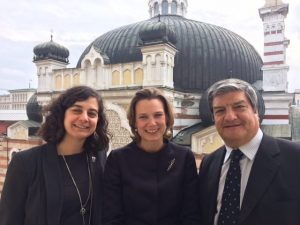HMDT Blog: Bulgaria and the Holocaust
Our Chief Executive, Olivia Marks-Woldman, is currently in Geneva for a plenary session of the International Holocaust Remembrance Alliance (IHRA) – the international organisation which brings 31 countries together to promote Holocaust education, remembrance and research.
In March 2017, Olivia travelled to Bulgaria as part of a three-person team from IHRA.

Olivia Marks-Woldman, UK IHRA Delegation, Katharina von Schnurbein, European Commission Coordinator on Combatting Antisemitism, and HE Sandro De Bernardin, Head of the Italian Delegation to the IHRA at the Sofia Synagogue.
Bulgaria is an observer country to IHRA, and is developing a range of initiatives to support Holocaust commemoration and education as part of its commitment to becoming a full IHRA member. Olivia, HE Sandro de Bernardin (head of the Italian delegation to IHRA and who will chair IHRA in
2017-18), Richelle Budd-Caplan from Yad Vashem, together with Katharina von Schnurbein from the European Commission, undertook a series of meetings with representatives from the Foreign Ministry, Education and Justice Departments, the Jewish community, Holy Synod of the Bulgarian Orthodox Church, Deputy Mayor of Sofia and the former President of Bulgaria, to support their work.
As part of the trip Olivia found out more about the experience of Jews in Bulgaria during the Holocaust, which is not as widely known as the experience of Western European Jews.
In 1934 the Bulgarian population was around six million people. 50,000 of them were Jewish – less than 1%.
Persecution against the Jews began in July 1940; Jews were excluded from public service, prohibited from marrying non-Jews and restrictions were placed on where they could live and what jobs they could do.
In March 1941, Bulgaria joined Nazi Germany, Italy and Japan in the Axis alliance in exchange for authorisation to occupy Greek Thrace, Yugoslav Macedonia and Pirot County in eastern Serbia. After the Wannsee Conference, German diplomats required the deportation to German-occupied territory of all Jews living in Bulgarian-controlled territories was required. Bulgaria began by rounding up approximately 11,000 Jewish residents living in the three territories Bulgaria occupied in 1941. They were taken to transit camps or assembly points before being taken to Treblinka, a forced-labour camp and killing centre, where almost all of them were murdered.
Shortly afterwards, following further Nazi demands, approximately 8,000 Jews were rounded up from Sofia, the capital of Bulgaria which caused protests from opposition politicians, Bulgarian intellectuals and members of the Bulgarian clergy and members of the public; farmers in the north of Bulgaria even threatened to lie down on the railway tracks to prevent trains from deporting Jews. Consequently, the deportations were halted and those who had been rounded up were released. Approximately 20,000 Jews were expelled from Sofia to the Bulgarian provinces, despite more public protests.
However, no Jews from historic Bulgaria were deported from the country, and at the end of the Holocaust, the Jewish population in Bulgaria was around 50,000, as it had been before the outbreak of the Second World War.
This ‘miracle of the Bulgarian Jews’ is commemorated each year on 10 March, a day also to remember the Victims of the Holocaust. Olivia attended the commemorative ceremony whilst in Sofia.